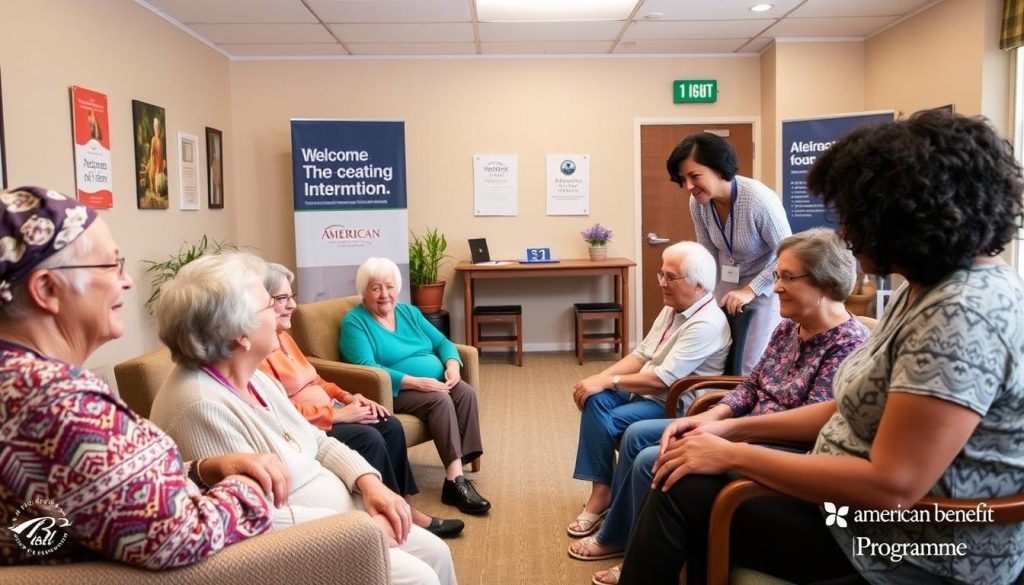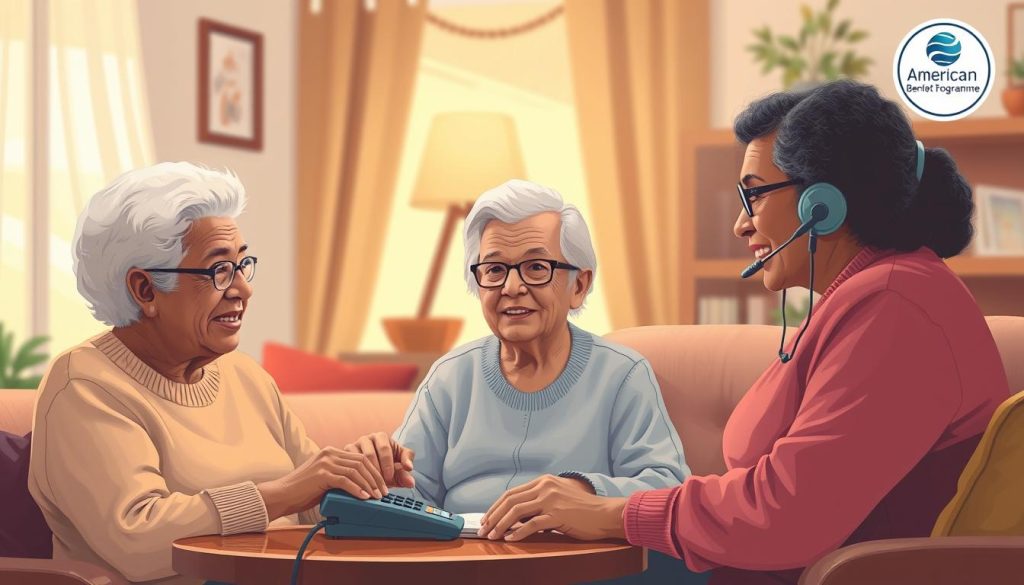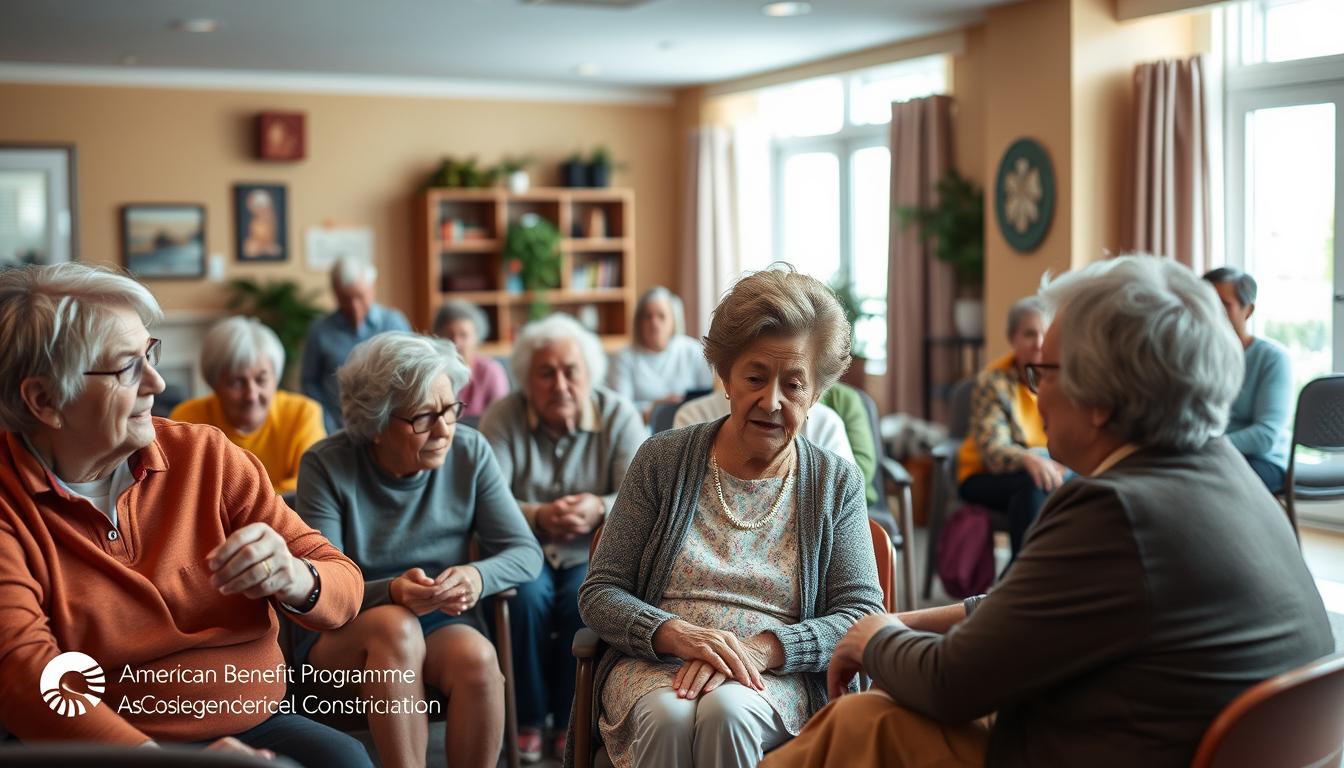Ever wondered how ready we are to help seniors in crisis? As we age, challenges can grow. It’s key to know about elderly crisis support and senior mental health care. With helpful info and resources, we can ensure our older loved ones get the help they need, right when they need it.
Key Takeaways
- Senior crisis intervention services are essential for timely support.
- Understanding common crisis situations can lead to better preparedness.
- Identifying signs of a crisis in seniors is vital for early intervention.
- Community resources play a crucial role in providing elderly crisis support.
- A strong support network can significantly impact a senior’s recovery.
- Accessing professional help ensures seniors get the best mental health assistance.
Understanding the Importance of Senior Crisis Intervention
Senior crisis services are very important for older adults facing tough situations. These can include sudden confusion or strange reactions to medicine. Life is full of surprises, and sometimes, despite our best efforts, emergencies can happen1. For family caregivers, dealing with these can be really hard, especially if they’re busy with other things1.
Crisis help aims to calm down tricky situations and keep patients safe. It also tries to stop actions like aggression, often seen in people with dementia2. Using care specifically designed for each person is key. Things like music or different activities can help calm them down2.
It’s also great to have care managers who know a lot about planning for emergencies. They understand how to help families through tough times with their knowledge and skills3. These pros are ready to help all day, every day. They work hard to make sure older adults get the care they need in emergencies3.
What Are Senior Crisis Intervention Services?
Senior crisis intervention services help older people facing tough situations. They offer emergency counseling, mental support, and resources for seniors’ unique problems. These services work non-stop. They help seniors 24/7, every day of the year during a crisis. This happens in places like senior centers and care homes4.
Older people often struggle after a crisis. They may not have enough strength, money, or friends to help them recover4. These services provide quick help when things like losing a partner happen. They link emergency helpers with seniors, leading them to more support4.
In Los Angeles County, a new program started in November 2022. It’s called the Alternative Crisis Response (ACR) initiative5. It helps people in mental distress in a gentle way. This avoids unnecessary police involvement. It ensures seniors get the help they need fast.
New methods have been created for older adults’ mental health. One example is Treatment Improvement Protocol 26. It gives tips on dealing with substance misuse in seniors6. Senior crisis services use these methods. They make sure seniors’ mental health is taken care of fully and kindly.
Overall, senior crisis intervention services are crucial for helping the elderly. They offer urgent and ongoing support. This improves seniors’ lives and helps them through hard times.
Common Types of Senior Crisis Situations
Caregivers and family should know about different crises that seniors may face. Mental health issues can come from not treating depression or anxiety. This can show as extreme sadness or worry. Today, 12.4% of the U.S. are older adults aged 65 and up. This is expected to grow to almost 20% in 30 years7. Such problems can get worse quickly and might need urgent counseling.
Many seniors might misuse substances too. Often, those with long-term illnesses use alcohol or drugs to deal with pain. Sickness getting worse can really change a senior’s health. This makes their care harder and increases stress. Also, most seniors have at least one long-term health issue, like high blood pressure (48%) or arthritis (47%)7.
Loss can lead to deep sadness and emotional trouble. Sadly, many older people don’t have many friends or family around. This can make them feel more alone and sad. Social isolation is a big problem, especially since nearly half of older women live alone7. When facing hard times, they might need help from a crisis program for elderly.
| Crisis Situation | Description |
|---|---|
| Mental Health Emergencies | Severe emotional distress often linked to untreated conditions like depression or anxiety. |
| Substance Misuse | Turning to alcohol or medications as coping mechanisms for chronic illnesses. |
| Chronic Illness Exacerbations | Worsening health conditions that complicate care and heighten stress. |
| Bereavement | Loss of loved ones leading to profound grief and emotional turmoil. |
| Social Isolation | Lack of social support contributing to loneliness and risk for crises. |
Knowing and understanding these crises is important. Immediate care can make a big difference. It can connect seniors to the help they need to feel better.
Community treatment services can be very helpful. They can support older adults facing these issues8.
Identifying Signs of a Crisis in Seniors
It’s very important to spot when seniors might be in crisis. There are signs like feeling super sad, not wanting to join in with friends, or acting very differently. These show they may need help fast.
- Requests for help or statements about feeling overwhelmed
- Increased withdrawal from social activities, friends, and family
- Notable changes in mood, such as intense sadness or irritability
- Changes in appetite or sleep patterns
Some major signs need quick action, like if someone talks about hurting themselves9. Feeling very hopeless, showing big changes in how they act, and saying they are a burden are serious warnings10. Feeling alone leads to more crises in older people.
| Sign of Crisis | Description | Immediate Action |
|---|---|---|
| Withdrawal | Significant decrease in interaction with others. | Encourage social engagement and reach out. |
| Mood Changes | Fluctuations between extreme sadness and irritability. | Conduct a senior mental health assessment with professionals. |
| Substance Misuse | Increased use of alcohol or drugs. | Seek professional help immediately. |
Spotting these signs early helps us deal with crises better10. When older adults show these signs suddenly, we need to act fast. About 16% of the US was over 65 in 201911. Fast help leads to better chances for them to overcome crises.
Exploring Elderly Crisis Support Options
It’s important for seniors to have good support when they face hard times. Community help is key to giving them the care they need. There are groups that give special help just for older people.
Community Resources for Seniors
Local groups offer a lot of support for older adults. They provide meals, friends, and classes just for them. These services help seniors stay connected and avoid feeling alone.
Feeling lonely can lead to big health problems, like sadness or heart issues12. Groups like Blue Cross Blue Shield can also help with mental health12.
Emergency Counseling Services
There are also emergency counseling services for seniors. They can call hotlines to get help fast and in private. These hotlines connect them with experts who know how to help with their specific needs.
| Service Type | Description | Contact Information |
|---|---|---|
| Community Support Programs | Services that offer meals, social interactions, and activities. | Local Senior Center: (555) 123-4567 |
| Senior Crisis Hotline | 24/7 assistance for emotional and mental health support. | National Hotline: 1-800-555-0199 |
| Emergency Counseling | Crisis intervention services that provide immediate help. | Crisis Center: 1-888-555-0123 |
For more info on help for seniors, you can visit online resources1312.
How to Access Senior Crisis Intervention Services
Getting help for seniors in crisis can seem hard. It’s important to know how to find help quickly. Reach out to local groups that offer crisis help first. These services often have hotlines such as the 988 Suicide & Crisis Lifeline. You can get help by calling or texting 988 or chatting online14.
Doctors and nurses are key in linking seniors to help. They know about community help and can get you the support you need. Crisis teams work round-the-clock to aid those feeling very upset14. Teams can come to you within two hours if you’re in a really tough spot15.
It helps when families know where to get help. Places like the Behavioral Health Crisis Centers give short-term aid. This helps seniors feel better after a tough time14. There are also programs for people under 21, like SASS. This includes many mental health services15.
Here’s a quick look at some helpful services:
| Service Type | Description | Contact Information |
|---|---|---|
| 988 Suicide & Crisis Lifeline | 24/7 crisis counseling via call or text | Call/Text 988 |
| CARES Hotline | Mobile crisis response available 24/7, responding within 2 hours | 1-800-345-9049 |
| Behavioral Health Crisis Centers | Short-term care for individuals in crisis | Contact local health departments |
| Mobile Crisis Response | On-site support for individuals in distress | Contact CARES Hotline for local response |
Using these services can give crucial support during hard times. Always stay informed and ask for help when needed. You’re not alone. Help is always there 
Choosing the Right Elder Care Crisis Intervention Program
Choosing the right elder care crisis program needs careful thought. First, think about the elderly person’s health, their need for emotional support, and past care experiences. Make sure the program’s services match these needs and that the staff are well-qualified.
Mental health care is key in these programs. Good programs look at both the mind and body. They support not just the senior, but their family too. This is because family members play a big part in an older person’s health.
To pick the best program, compare different ones. Below is a table that shows what to look at:
| Criteria | Program A | Program B | Program C |
|---|---|---|---|
| Service Offerings | Crisis counseling, In-home support | Emergency housing, Relocation assistance | Crisis intervention, Family support services |
| Personnel Credentials | Licensed therapists, Certified Geriatric Care Managers | Social workers, Certified care specialists | Trained mental health professionals, Patient Navigators |
| Approach to Mental Health Care | Holistic and integrative | Focused on family dynamics | Comprehensive mental health and physical care |
| Cost Structure | Sliding scale, Insurance options available | Fixed rate, Subsidized services offered | Varies by service, Family pays all costs |
In summary, picking an elder care program means looking closely at what they offer, how qualified the staff are, and how they approach care. With more older people needing help, finding the right solution is very important1617. By looking at these points, families can make great choices for their loved ones in tough times.
Utilizing Senior Mental Health Assistance Resources
It’s very important for seniors to have good mental health resources. Many programs help older adults feel better mentally. These services include wellness programs that make mental health better and offer helpful discussions.
Senior Wellness Resources
The Community Resource Finder is great for connecting seniors with important services. Things like homecare, community help, and medical support are included. “Yoga for Seniors” programs also help seniors stay physically and mentally fit by improving strength and balance.
Lifescape’s Senior Mental Health Program uses the Healthy IDEAS program. It helps seniors learn about depression signs from chronic illnesses. This empowers them and their caretakers to seek help18. Also, the Friendship Line offers emotional support and help during tough times19.
Senior Mental Health Outreach Initiatives
Reaching out to seniors is key for their mental health access. The Alzheimer’s Association provides round-the-clock help and guidance for those with dementia19. They guide seniors to important services like housing and in-home care. The Senior Legal Helpline gives legal advice concerning elder law, making sure seniors get the right help19.
There’s also the Geriatric Depression Self-Assessment Tool for checking mental health18. All these initiatives help seniors feel less alone and offer the support they need.
How to Build a Support Network for Seniors in Crisis
Building support networks for seniors in crisis is very important. Family, friends, and groups in the community help a lot. They offer care and help to make seniors feel valued and connected.
Seniors have lots of experience, over 50 years, in handling emergencies. They are key to helping groups that offer disaster help20. They know important history and facts that help in responding to crises20.
Using the skills of seniors makes crisis teams better and diverse. It brings people together across ages. Such teamwork strengthens the bond between different generations20.
There are hurdles to get seniors involved, like keeping them healthy and overcoming talking difficulties. We must value their different views in planning for crises20. Quick, well-planned, and together efforts are important in solving crises21.
Programs that care for all aspects of a senior’s health help a lot during long-term crises. Starting slowly helps communities use services well and lets all seniors join in21. Studies show that working together helps people stay well21.
Creating a supportive place for seniors in tough times is key for the community to bounce back. Good talking, assessing, and regrouping are important ways to make support networks better21.
The mental well-being of seniors is complex, especially after the pandemic. Many older people have mental health issues but don’t get the help they need22. To solve this, groups are working to get better mental health care for seniors22.
Having seniors help in crises is good for them and the whole community. Their experience makes support systems stronger and more helpful20.
| Key Benefits of Senior Support Networks | Description |
|---|---|
| Enhances Community Cohesion | Involving seniors strengthens the bonds within the community. |
| Fosters Intergenerational Solidarity | Creates opportunities for interaction across age groups. |
| Improves Mental Health | Engagement in support systems boosts self-esteem and purpose. |
| Utilizes Critical Experience | Seniors bring invaluable knowledge to crisis response efforts. |
| Strengthens Social Capital | Increased trust leads to quicker and more effective recovery. |
Understanding the Role of Senior Crisis Hotlines
Senior crisis hotlines are very important for older adults who face tough times. They help with mental health issues and substance use problems. Over 1 million adults over 65 have a substance use disorder23. These hotlines connect them to trained counselors right when they need it most.
These hotlines are private, which makes seniors feel safe to get help. Many seniors struggle with mental health because of loneliness, money worries, and health problems. The COVID-19 pandemic has made these problems worse, causing more stress and anxiety23.
There are many groups that offer these hotlines, like the National Suicide Prevention Lifeline and the SAMHSA Helpline. They are open all the time, every day24. They provide different types of help, such as one-on-one and group counseling. This support can really help seniors feel better23.

Crisis lines also help seniors with tough mental health and substance issues. They give instant help and info on how to deal with problems long-term. They tell seniors about support in their community too.
| Hotline | Focus Area | Established | Availability |
|---|---|---|---|
| National Suicide Prevention Lifeline | Emotional distress | 2005 | 24/7 |
| SAMHSA Helpline | Mental health & substance abuse | Not specified | 24/7 |
| Alzheimer’s Association 24/7 Helpline | Support for Alzheimer’s caregivers | Not specified | 24/7 |
Conclusion
Senior crisis intervention services are very important. Over 55 million Americans deal with mental health or substance issues each year. These services help older adults stay well25.
They do more than fix problems right now. They also help from the start and plan for the future26. By working together, communities can help all kinds of people. They make sure no one is ignored27.
There are many ways to help seniors in crisis25. Knowing about help lines and local programs is key26. This knowledge can prevent hospital trips. It can also make seniors’ mental health better27.
To improve these services, different groups must work together25. This includes doctors and local groups. By focusing on understanding and easy access, we can help more. This way, crisis help will really meet seniors’ needs26.
Source Links
- Senior Placement-Why Is Crisis Intervention Such an Important Service?
- crisis interventions: managing behaviors of dementia patients
- Crisis Intervention
- Senior Crisis Team — Trauma Intervention Program of Orange County
- Alternative Crisis Response (ACR) – Department of Mental Health
- Resources for Older Adults
- Crisis Model for Older Adults: Special Considerations for an Aging Population
- Behavioral Health
- Crisis Services: Identifying a Crisis
- The Santé Group – Crisis Response – Treatment & Recovery Learn the Signs
- Suicide Warning Signs and Prevention Strategies for Older Adults
- Mental Health Services for Seniors | Members
- Mental health care for older adults: recent advances and new directions in clinical practice and research
- Crisis Services | dmh.mo.gov
- Crisis Services
- Elder Rights
- What To Do When A Senior’s Care Is Too Much For The Family – Always Best Care
- Senior Mental Health Program – Helping older adults obtain appropriate care
- Senior Resources – NAMI Virginia
- How can seniors be effectively involved in crisis response?
- Care and support in a crisis – SCIE
- How Do We Address the Mental Health Crisis Among Older Adults?
- Mental Health Hotlines for Seniors | 866-903-3787
- Support Hotlines: The History of Phone Support Hotlines and How They May Help Caregivers
- Crisis Services: Addressing Unique Needs of Diverse Populations
- National Guidelines for Behavioral Health Crisis Care
- Crisis intervention for people with severe mental illnesses

Leave a Reply